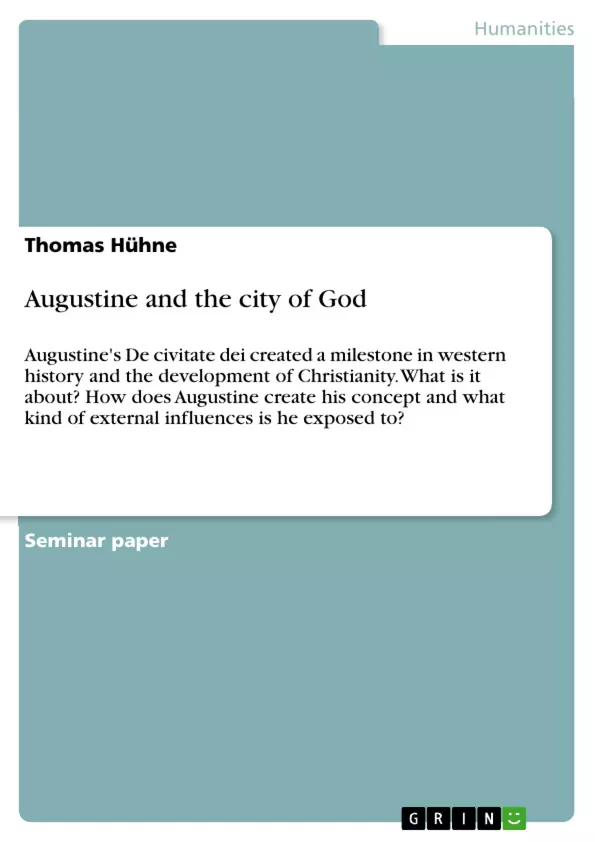The purpose of this essay is to show the development of the cognitive reasoning that motivated Augustine to create his work De civitate Dei. We will consider several interpretations of the City of God in order to provide a broad spectrum that helps developing an opinion about his work. In order to understand his thought process, it is important to also consider the historical and sociological background that Augustine lived in since it constitutes a rudimentary basis to understand him. Furthermore, we will analyze the heritage of the cities he creates. An innovative approach is also given in Augustine‟s work since it constitutes the first record of a created progress. The city of God and its development are depicted as a continuous process and were very unique and innovative for Augustine‟s time. It established a new era in history writings as well as in theological terms.
Furthermore, focus will be laid on human beings living together with angels in their cities, as well as the role of the church on Earth. The final focus will be directed towards the concept of dualism in Augustine and his sociological/historical environment. In order to mention the importance stateism creates in Augustine, an indication towards this matter will be made before aiming for a conclusion. We will now present a short abstract about the life of Augustine, focusing on the historical context that accompanied it.
Inhaltsverzeichnis (Table of Contents)
- Introduction
- Augustine's life in the historical context
- De Civitate Dei
- Civitas dei
- Foundation of the city of God and the city of Man
- Humans/Saints and Angels
- Humans on earth
- City of God and Church
- Civitas terrena
- The intertwined cities
- Concept of dualism
- Stateism in Augustine's thinking
- Conclusion
Zielsetzung und Themenschwerpunkte (Objectives and Key Themes)
This essay aims to explore the intellectual journey that led Augustine to write his groundbreaking work, *De civitate Dei*. It analyzes the historical and social context of Augustine's life, examines various interpretations of the City of God, and explores the legacy of his work. The essay also delves into the concept of dualism in Augustine's thought and the influence of stateism on his ideas.
- The development of Augustine's thought leading to *De civitate Dei*
- The historical and social context of Augustine's life
- Interpretations of the City of God
- The concept of dualism in Augustine's thought
- The influence of stateism on Augustine's ideas
Zusammenfassung der Kapitel (Chapter Summaries)
The essay begins by examining Augustine's life and the historical context that shaped his thinking. It discusses the fall of Rome in 410 and its influence on Augustine's decision to write *De civitate Dei*. The essay then explores Augustine's intellectual journey, highlighting his early involvement with the Manichean sect and his subsequent conversion to Christianity. The essay also delves into Augustine's time in Rome and Milan, where he developed his philosophical and theological views under the influence of figures such as Ambrose and Plato.
The essay proceeds to delve into the concept of *Civitas Dei* (the City of God) and *Civitas terrena* (the City of Man). It examines the foundations of these two cities and their relationship to human beings, saints, angels, and the church. The essay also explores Augustine's concept of dualism, which highlights the interconnectedness of the two cities and their respective roles in human history. The essay concludes by discussing the influence of stateism on Augustine's thinking and its impact on his ideas about the relationship between religion and politics.
Schlüsselwörter (Keywords)
The essay focuses on Augustine, *De civitate Dei*, the City of God, the City of Man, dualism, stateism, Christianity, historical context, and social influence.
Frequently Asked Questions
What is the main theme of Augustine's "De civitate Dei"?
The work explores the coexistence and conflict between two symbolic cities: the City of God (Civitas Dei) and the City of Man (Civitas terrena).
What historical event motivated Augustine to write this work?
The fall of Rome in 410 AD served as a primary catalyst, prompting Augustine to address the theological and sociological implications of the empire's decline.
How does Augustine define "dualism"?
Dualism in Augustine's thought refers to the intertwined nature of the two cities on Earth, representing different spiritual orientations and destinies.
What is innovative about Augustine's view of history?
He introduced the concept of linear progress in history, depicting the development of the City of God as a continuous, purposeful process.
What role does the Church play in Augustine's cities?
The essay examines the role of the Church on Earth as a representative of the City of God, while acknowledging the complexities of human and angelic interaction.
- Quote paper
- Thomas Hühne (Author), 2012, Augustine and the city of God, Munich, GRIN Verlag, https://www.grin.com/document/195683



